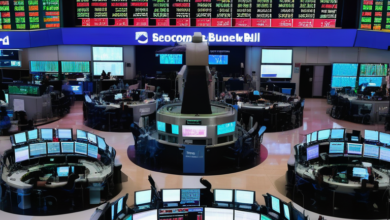Is the Stock Market Going to Crash in 2024: Expert Analysis

Key Highlights
- With technology stocks at the forefront, the stock market is on an upward trend and hitting new highs.
- By cutting interest rates, the Federal Reserve is expected to give a boost to the market.
- Even though inflation worries exist, predictions for solid earnings through this year keep the outlook for the stock market positive.
- The range of winning stocks has grown; big companies are leading while other areas also see improvements.
- Indicators like how much people spend and what businesses earn are keeping things looking good for the stock market.
- According to experts, we shouldn’t expect any major downturns in 2024’s second half; they think it’ll stay steady.
Introduction
In 2024, investors all over the globe are facing a mix of unpredictability and chances. While people speculate and analyze, the future of the stock market is something that experts and fans are really focusing on. With memories of past downturns in mind and economic signs going up and down, there’s a lot to watch out for as we get into the latter half of the year. This article will explore what makes the market tick, offering knowledge on how to deal with whatever comes next. It’s important to stay updated so you can be ready for any shifts in the stock market come 2024.
Is a 2024 Stock Market Crash in Q3 Inevitable? Expert Insights
In the third quarter of 2024, there’s a lot of talk about a potential stock market crash. Experts have different views on this matter. To really get what might happen with the stock market, it’s important to look at what’s going on right now, learn from past trends, and consider various economic signs that experts keep an eye on. Around the world, things like government policies, new tech developments, big political changes, and interest rates are all key factors that could influence whether or not we see a market crash soon.
Understanding the Current Stock Market Trends and Predictors
To get a grip on what’s happening in the stock market right now, it’s important to keep an eye on things like the Dow Jones, how fast the economy is growing, and how much money companies are making. When thinking about whether there might be a big drop in the stock market in 2024, we look at stuff like interest rates, how prices are going up (inflation), and if stocks seem too expensive compared to their actual value. To figure out if the market is healthy or not, experts check out a bunch of different signs including how many stocks are going up versus down (market breadth), current stock prices, and how much those prices jump around (volatility). With artificial intelligence stepping into play more these days; it helps sort through all this data so investors can make smarter choices. By understanding terms related to natural language processing (NLP), people investing can really wrap their heads around what’s changing in the world of buying and selling stocks.
Analyzing Historical Data: Lessons from Past Crashes
Looking back at how the market has crashed in the past can really teach us a lot about what might happen next. When we dive into history, we see patterns and warning signs before big drops happened, like during the Great Depression or other times when things went south quickly. By paying attention to these clues—like prices being too high or growth that just doesn’t seem right—we can get better at guessing when trouble is coming. This knowledge helps people who invest money make smarter choices, trying to keep their investments safe from whatever comes next.
Key Economic Indicators to Watch in the Second Half of 2024
As we move through the latter part of 2024, it’s important to keep an eye on certain things that can really shape how the stock market behaves. Things like interest rates, how prices are going up or down (inflation trends), and if people are buying stuff (consumer spending) will be super important. Also, looking at how fast our economy is growing (GDP growth), along with changes in jobs available (unemployment rate) and how much money companies are making (corporate profits), can give us a good idea about where the market might head next. By paying attention to these details, you’ll get a full picture of what’s happening in the market and be better prepared for any changes that come your way. It’s all about staying informed so you can tweak your investment plans as needed for success.
Expert Opinions on Market Stability and Volatility
When it comes to understanding the ups and downs of the stock market, what experts think is really important. They look at things like GDP, interest rates, and how much profit companies are making to figure out where the market’s headed. A lot of them say that spreading your investments across different types of assets can help protect you when the market gets rough. Also, financial advisors often suggest keeping an eye on the long game instead of getting too worried about short-term changes in the market. In a nutshell, if you keep up with what’s happening in the markets and listen to professional advice, you’re more likely to make smart investment choices even when things seem uncertain.
Major Factors Influencing the 2024 Q3 and Q4 Market Outlook
In the second half of 2024, how the market looks will be shaped by a bunch of different things. Around the world, decisions about money and new tech changes are big players. What’s happening in politics and changes to interest rates also have their say. With all these moving parts, getting a grip on what might happen with the market isn’t simple but it’s super important if you want to make smart choices during that time.
The Impact of Global Economic Policies on the Stock Market
The decisions made by the Federal Reserve and other central banks around the world really matter when it comes to how well the stock market does. Right now, a lot of people who invest money are looking forward to possible cuts in interest rates by the Federal Reserve. They think this will make things better for stocks.
When there’s a change in monetary policy, like lowering interest rates, it can make borrowing cheaper for both companies and regular folks. This can help businesses grow and make more money, which is good news for their stock prices. On flip side though if interest rates go up that could slow everything down and might even cause stock prices to drop.
On top of all this stuff about interest rates and economic growth trade policies between countries play a big role too Trade disagreements can shake things up causing uncertainty Investors pay close attention because changes in these policies affect how much profit companies might make All these factors show just how connected our global economy is It’s important not only look at what’s happening locally but also what’s going on around world when thinking about investing in stocks
Technological Innovations and Their Effect on Market Dynamics
In the world of technology, especially with stuff like artificial intelligence (AI), there’s a big change happening in how markets work. Companies that are really into tech advancements, Nvidia being one example, are leading the way and doing better than many others. They’re seeing lots of benefits from getting better at AI and using it in different kinds of jobs.
With the Nasdaq, which is full of tech companies’ stocks, beating other market indexes shows just how much impact these tech giants have. The great results we’re seeing from companies focused on information technology and communication services are pushing up stock market numbers.
The internet has been super important too in changing things up for businesses. Companies that use the internet well to run their operations and connect with customers are growing fast and finding new ways to win big time. It’s clear that technological innovations like AI and the internet aren’t just small changes; they’re completely transforming what drives success in today’s stock market.
Political Events and Their Potential Influence on the Market
Political happenings around the world and at home can really shake up the stock market. When governments make big decisions, hold elections, or if there’s tension between countries, it tends to make the market jittery and affects how people feel about investing.
Over in the United States, things like who wins a presidential election or changes in what the government decides on policies can push and pull on stock prices quite a bit. People putting their money into stocks are always keeping an eye out for these kinds of political moves because they want to guess how it might help or hurt companies’ profits and overall economic growth.
Across the pond in Europe and our neighbors up north in Canada, politics play just as big of a role. Whether it’s talks about Britain leaving the EU (Brexit), new prime ministers taking office, or shifts in trade agreements – all these events stir confidence levels among investors. They’re trying to figure out what each political turn means for economic stability across borders as well as chances for making good investments.
For anyone looking into investing their hard-earned cash into stocks, paying attention to this dance between politics and market trends is key. Getting why politics matters helps folks dodge some risks while catching opportunities amidst all that ups-and-downs action known as volatility.
Interest Rates and Inflation: A Double-Edged Sword
Interest rates and inflation trends are key things that affect the stock market. When these rates or levels change, they can either help or hurt the economy and how investors feel.
The Federal Reserve is super important because it decides what interest rates will be through its monetary policy decisions. With lower interest rate, it’s cheaper for businesses and people to borrow money. This means people might spend more, businesses could make more money, and this usually makes the stock market go up.
On the flip side, when interest rates go up, borrowing costs more for everyone. This can slow down spending by consumers and reduce profits for companies which might cause stock prices to drop.
Inflation trends matter too in how well the stock Market does. A little bit of inflation shows an economy doing well but a lot of inflation isn’t good because it reduces how much your money can buy leading to economic troubles Investors keep an eye on both inflation patterns as well as actions taken by The federal reserve so they know best where their investments stand.
How to Prepare for a Potential Market Downturn in Summer or Fall 2024
Investors should always be ready for the ups and downs of the stock market, no matter what year it is. Even though we can’t say for sure if there will be a downturn in 2024, it’s smart to have a plan to deal with possible risks.
One key way to handle risk in the stock market is through diversification. By spreading your investments across various types of assets and sectors, you can lessen your risk tied to any single investment. This strategy helps safeguard against big losses when the market goes down.
Looking at investing from a long-term viewpoint is also crucial. It’s tough and usually doesn’t work out well trying to guess how the market will move in the short term. Instead, by keeping an eye on your long-term financial goals and sticking with a steady plan, you can better manage through times of volatility.
During periods when the market gets rough,** investors might look into safe havens like gold,** real estate**,and treasury bonds.These options tendto hold their ground or even do well during tough times,making them good choicesfor protectingyour investments.
Diversification Strategies to Mitigate Risks
Spreading your money across various types of investments, like stocks, bonds, and real estate is a smart move to lessen the chances of losing big in the stock market. This approach helps you not put all your eggs in one basket and keeps you safer when prices drop.
With diversification comes the idea of putting your money into different categories such as shares or property. This mix can help soften the blow if one investment doesn’t do well because it’s less likely that everything will go down at once. It’s about balancing things out so no single bad apple can spoil your whole bunch.
Keeping an eye on how much risk you’re comfortable with is also part of spreading out your investments wisely. You’ve got to check up on them regularly to make sure they still fit what you’re aiming for financially and adjust as needed based on how markets are moving.
While diversifying won’t completely shield you from losses, it makes riding through ups and downs smoother by reducing risks tied to market swings over time. By covering more ground with where you invest—across different sectors—you stand a better chance at weathering storms without taking too heavy hits.
The Importance of a Long-Term Investment Perspective
Keeping an eye on the long haul is key when it comes to doing well in the stock market. It’s pretty tough and usually doesn’t work out trying to guess exactly when to buy or sell based on what you think will happen soon. Instead, by sticking with your financial plans for down the road and keeping a steady way of investing, you can handle ups and downs better and see real growth over time.
Over years, despite its many highs and lows, the stock market tends to go up. By focusing on investing for years ahead, people can really take advantage of how money grows over time thanks to economic expansion.
This approach is super important if you’re saving for retirement. Starting early and adding money regularly means you could end up with a good amount saved up. The stock market has a big part in making that possible because it’s known for growing over many years.
It’s crucial not just during smooth sailing but also through rough patches; remembering that there are always going to be good times after bad ones helps investors stick with their plan without getting thrown off course by short-term swings.
Safe Havens During Market Turbulence
When the market gets rough, people look for safe places to keep their money. These are called safe haven assets because they usually hold onto their value or even get more valuable when things are uncertain.
Gold is a big favorite in times like these. It’s seen as a reliable way to save your wealth and protect against rising prices and changes in how much money is worth. When the stock market goes down, gold often goes up because folks see it as a secure option.
With real estate, you’ve got another solid choice during shaky times. Owning property that makes money through rent can give you some steady cash flow and might increase in value as time goes on.
Then there’s treasury bonds – especially those from the government – which are super low risk and pay you interest regularly. People run towards them when everything else seems risky because they offer peace of mind with their stable returns.
If you’re trying to figure out where to put your money when markets freak out, think about what risks you’re okay with and what goals you have for investing. Spreading your investments across different types of safe havens like real estate and diversification strategies can help lower your overall risk while keeping your investment safer during wild market swings.
Timing the Market vs. Time in the Market: What Experts Say
Trying to guess when the stock market will take a dive, known as timing the market, is something lots of investors try their hand at. But most experts think it’s really hard to do right, if you can even do it at all. Predictions about the market are often way off base, and trying to act on these guesses might mean you miss out or lose money.
Instead of trying to outsmart everyone else with predictions, experts suggest sticking around in the stock market for a long haul. History shows us that despite some ups and downs along the way, staying invested tends to pay off over time because of overall growth in the stock market.
How investors react during times when things seem uncertain plays a big part too. Getting spooked by sudden changes and making hasty decisions usually doesn’t end well. It’s better to keep cool-headed with an investment plan that covers different types of investments and maybe get advice from someone who knows their stuff financially speaking.
Conclusion
In today’s shaky economic scene, it’s really important to keep up with what’s happening and be ready for anything. Looking back at past trends, keeping an eye on the main signs of how the economy is doing, and spreading out your investments are smart moves to handle any tough times that might come our way in the markets. The pros all say that thinking about your investments over a long haul and mixing them up well can help you dodge some risks. Sure, guessing when the market will crash is pretty hard but if you’re ahead of things with how you invest, you could find yourself in a good spot to make the most of chances when they pop up. So remember: be alert, go for diversification in your investment plan, and always keep an eye on those big financial dreams down the road.







